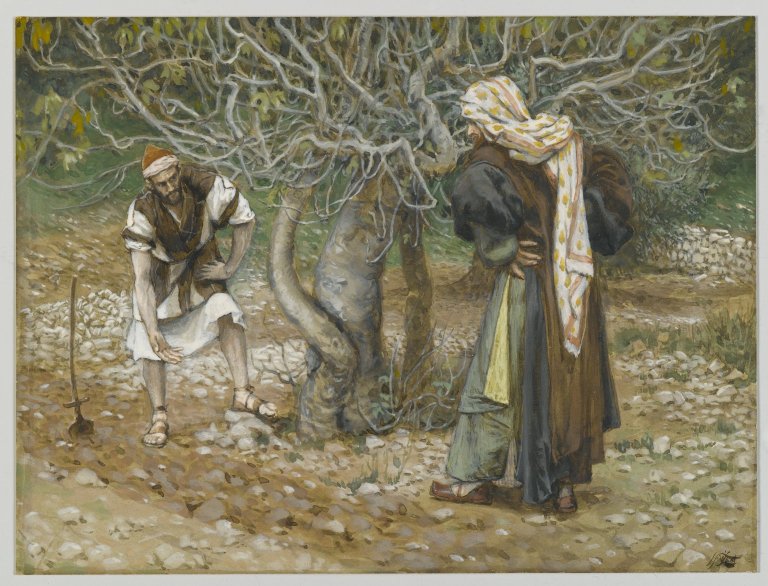In a sermon titled “Is God an Ax Murderer?, Pastor Lance McKinnon looks at Jesus’ well-known, but not well-understood parable of the fig tree.

Scripture reading: Luke 13:1-9 (NIV)
There were some present at that very time who told [Jesus] about the Galileans whose blood Pilate had mingled with their sacrifices. And he answered them, “Do you think that these Galileans were worse sinners than all the other Galileans, because they suffered in this way? No, I tell you; but unless you repent, you will all likewise perish. Or those eighteen on whom the tower in Siloam fell and killed them: do you think that they were worse offenders than all the others who lived in Jerusalem? No, I tell you; but unless you repent, you will all likewise perish.”
And he told this parable: “A man had a fig tree planted in his vineyard, and he came seeking fruit on it and found none. And he said to the vinedresser, ‘Look, for three years now I have come seeking fruit on this fig tree, and I find none. Cut it down. Why should it use up the ground?’ And he answered him, ‘Sir, let it alone this year also, until I dig around it and put on manure. Then if it should bear fruit next year, well and good; but if not, you can cut it down.’”
In response to a retelling of the tragic story of Pilate murdering a group of Galileans as they were worshiping and making sacrifices, Jesus adds the equally tragic story of 18 people killed when the tower at Siloam fell. With both events in mind, Jesus challenges the common, though mistaken assumption that tragic events are always the result of sin and guilt. He tells his audience that they need to repent of presuming that the Father is adding up our sins and punishing us through random acts of violence and tragedy that come our way. He warns, “Unless you repent, you too will all perish.”
Jesus knows that if we carry this wrong-headed thinking about the Father in our hearts, the suffering and tragedy we all experience will be a weight too heavy to bear, killing us even in our worship of God.
Jesus then follows up that discussion with his well-known (but frequently misunderstood) parable of the fig tree. He does so to help his disciples think differently about what kind of God the Father is and how he deals with our sin and guilt. The owner of the vineyard in the parable is a stand-in for the erroneous viewpoint that people typically hold about God. The vinedresser is the Christ figure who helps us see how God actually deals with humanity, which is represented by the fig tree.
As with all fruit trees, under the law of Moses fig trees were protected from being cut down. They were precious and meant for the enjoyment of the owner. Note that in this parable, the fig tree was planted in a vineyard not an orchard. The Father did not “plant” us in his garden to market us or to produce fruit for his livelihood. We were created for his pleasure and enjoyment.
In Leviticus 19:23-24, we see that it was forbidden to take fruit from fruit trees for the first three years. In the fourth year the fruit would “be holy, an offering of praise to the Lord.” For the Jews hearing this parable, the act of the owner wanting to cut down the fig tree because he couldn’t find fruit on it for three years would have run counter to what the law stated. If we see God looking to cut us down when we don’t produce, we hold an image of God in our minds that contradicts his own revelation to us.
The vinedresser at this point speaks to the “man”—the mythological god we have created—and echoes what the law would have said to do: “Leave it alone for one more year.” This phrase “leave it alone” comes from the Greek aphes, carrying the meaning of forgive. It’s the same word Jesus utters from the cross in Luke 23:34, “Father, forgive (aphes) them….” The vinedresser takes upon himself the fruit bearing of the fig tree by digging around it and fertilizing it with dung. It would be a smelly job of blood, sweat and tears but he gets to the root of the problem.
This parable in the hands of Jesus challenges any concept we might hold of a God whose patience runs out on us and looks to destroy us like some sort of ax murderer. Rather, he comes to us in Jesus and operates through grace; through aphes. Through the crucifixion, digging into the dirt and dung of death, Jesus has rooted out our unfruitfulness. We are called to repent of any wrong-headed notions that it is up to us to produce fruit in the fear of an axe-crazed owner bent on our destruction. We abide in the fruitfulness of our Savior who works only through aphes.
The parable ends with the vinedresser saying to the “man,” “If it bears fruit next year, fine! If not, then [you] cut it down.” We can trust in Jesus working through grace for our fruitfulness, or we can perish in our wrong-headed belief in a mythological god. The mythological god will cut us down every time, but the real God never will.



Please note that comments are moderated. Your comment will not appear until it is reviewed.